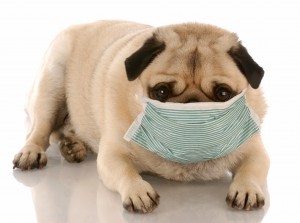<Updated – 13SEP19>
< A short link to this page – http://bit.ly/K9Cough >
Canine cough or kennel cough is actually a lay term for Canine Infectious Respiratory Disease Complex (CIRDC). There are many bacteria and viruses which can cause this illness. The most prevalent of the bacteria that cause this illness is Bordetella bronchiseptica. This illness involves an inflammation of a dog’s trachea and upper bronchii and is similar to bronchitis in a human. The passage of air over the inflamed tissues can be very irritating which causes the dog to cough.
Canine Infectious Respiratory Disease Complex is highly contagious to other dogs. It can be transmitted through the air from one dog to the next or by contact with contaminated objects such as a common water dish at the dog park or in  front of a dog-friendly store. Sitting next to an infected dog at a vaccination clinic is all it may take to catch canine cough. It’s basically transmitted the same ways as the “common cold” is transferred from one person to another. Just like people that work with the public, or like school children, the more dogs your dog associates with, especially those that are unvaccinated, the greater the opportunity to contract canine cough. That’s why the canine cough vaccine is often recommended for dogs that; frequent the dog park, attend daycare, are boarded or groomed, are in a training class, go to dog shows or dog sport events, visit the veterinarian frequently, or are just around lots of other dogs. Most boarding kennels, daycares and training classes require guests to be vaccinated for CIRDC.
front of a dog-friendly store. Sitting next to an infected dog at a vaccination clinic is all it may take to catch canine cough. It’s basically transmitted the same ways as the “common cold” is transferred from one person to another. Just like people that work with the public, or like school children, the more dogs your dog associates with, especially those that are unvaccinated, the greater the opportunity to contract canine cough. That’s why the canine cough vaccine is often recommended for dogs that; frequent the dog park, attend daycare, are boarded or groomed, are in a training class, go to dog shows or dog sport events, visit the veterinarian frequently, or are just around lots of other dogs. Most boarding kennels, daycares and training classes require guests to be vaccinated for CIRDC.
The most typical symptom of canine cough is a persistent dry cough that almost sounds as if your dog is “honking” like a goose. When we adopted our dog Shed from the Dane County Humane Society many, many years ago, she started showing the symptoms of canine cough in a few days. I remember waking up in the middle of the night to the sound of a flock of geese “honking” under the bed. Most of the time your dog will appear healthy except for the cough. They’ll eat normally and will still be active. They may gag and produce white foamy phlegm. Exercise and pressure from their collar against their trachea (from pulling on leash) may cause a bout of coughing.
If your dog is coughing repeatedly it’s a good idea to take them to the veterinarian. While canine cough often resolves on its own, there are several other infections, as well as cardiac issues, that cause coughing, which can be fatal if not treated. Pneumonia can result as a secondary infection to canine cough. Typical treatments for canine cough include a cough suppressant, and possibly antibiotics as secondary infections can occur from canine cough. It is also essential that you keep your dog away from other dogs while they have canine cough so that they do not spread the disease.
There are different types of vaccines for canine cough/CIRDC; however, because there are so many infectious agents that can cause the disease, a dog can be vaccinated and still get the disease. The vaccines do often reduce the severity of the disease. Vaccines can be injectable or given orally or intranasal. Dr. Ronald Schultz (Professor and Chair of the Department of Pathobiological Sciences at the School of Veterinary Medicine at the University of Wisconsin-Madison) recommends that dogs that will be around other dogs be vaccinated annually with the intranasal vaccine which immunizes against Bordetella. Since the normal path of infection for these diseases is via the respiratory system, Dr. Schultz feels the intranasal approach, which immunizes via the respiratory system, is the most effective way to administer this vaccine.